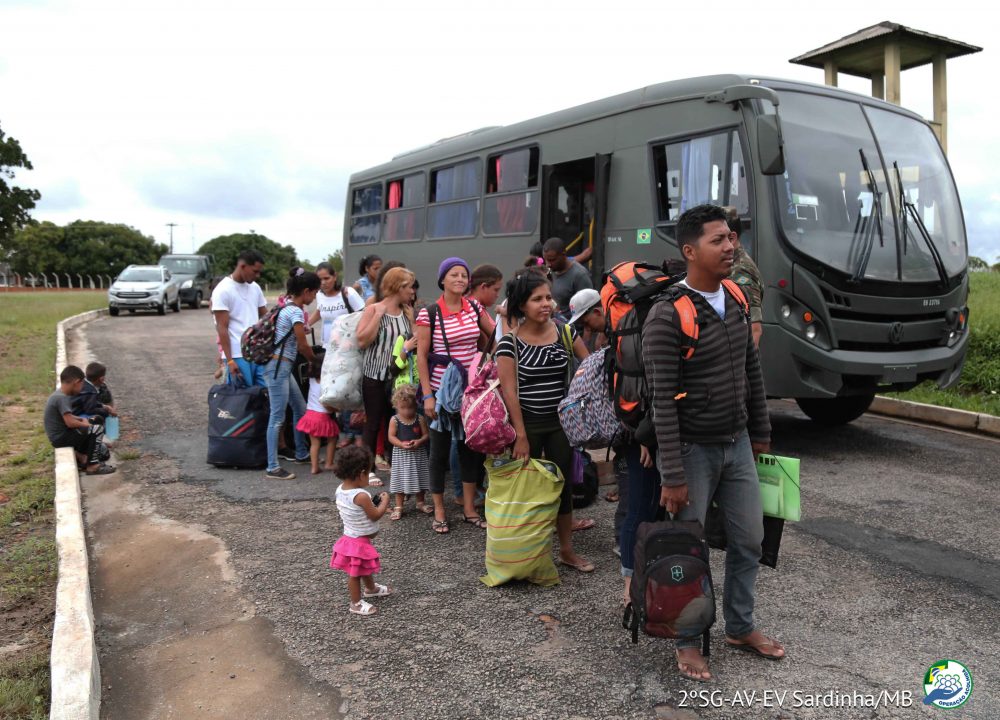The objective of this initiative, supported by the EU EUROsociAL+ Programme, not only aims to generate a space for the exchange of general background information on legislation, jurisprudence and services, but also to provide specific data that ensure better advocacy in particular cases. Currently, the region receives 39% of asylum applications, the highest number in the world.

Photo: Welcome Operation from Brazil
The COVID-19 pandemic has further endangered the well-being of migrants and refugees in Latin America, especially for women, boys and girls, who were already in an extremely precarious situation due to the Venezuelan and Central American migration crisis. There is an additional challenge because the region has the highest number of asylum applications worldwide with 39% of the total, with a very low recognition rate which, according to UNHCR data, only reaches 4%. And it is estimated that the migration phenomenon will continue, and even increase, in the coming decades, especially during the post-COVID stage, which should motivate Public Defender’s Offices in the region to act with greater emphasis in advocating for this group to face up to situations that are harmful to their human rights. This view was confirmed by the experts gathered at the international seminar “Access to Justice for People in the Context of Mobility in Latin America”, an event organised by the European Union’s EUROsociAL+ programme, led by FIIAPP, and the Inter-American Association of Public Defenders (AIDEF).
The UN Special Rapporteur on the Human Rights of Migrants, Felipe González stated that “Latin America presents serious deficiencies in the guarantee of access to justice for migrants, which negatively impacts the exercise of their other human rights and favours impunity for the crimes of which they are victims”. “Access to justice for migrants should include not only the criminal sphere, but also the civil, labour and administrative spheres, among others. In situations relating to immigration detention, deportation processes and others of an administrative nature, it is essential to ensure said access” he added.
The seminar also presented some of the main conclusions from the diagnosis “Access to Justice for People in the Context of Human Mobility” carried out by EUROsociAL+ at the request of the AIDEF. This report points out, among other aspects, that the difficulties faced by migrants and refugees seeking to regularise their documentary situation have been aggravated by the COVID crises, since procedures in many countries are suspended, with the consequent fear and risk of being returned to their countries of origin. The diagnosis also describes the fundamental unmet legal needs they face, such as access to documentation for regularisation, as well as access to rights such as health, education, advocacy for non-refoulement, collective expulsions and legal representation for persons criminally prosecuted.
On the other hand, as the study shows, 21% of Public Defender’s Offices consider that in their respective country, and even in their own institution, they are not aware of the migrants’ and refugees’ legal needs. In addition, in 36% of cases, the Public Defender’s Offices do not have a specific line of work relating to the interests of these groups. Rather such tasks come within the services they offer to users in general, and 43% of Public Defender’s Offices do not have a protocol or special instrument for the provision of legal assistance to migrants and foreigners. The Public Defender’s Offices have also pointed out that the legal assistance they provide to migrants does not have a gender focus in 29% of countries, nor is it adapted to children in the context of human mobility.
This situation, as pointed out by the experts gathered at the seminar, reveals the importance of having a regional assistance network in aspects such as early advice to potential beneficiaries of international protection and legal guidance in order to understand the regular routes of entry and permanence, as well as the dissemination of the best practices in legal assistance.
For this reason, the AIDEF, coordinated by the Argentinian National Public Defender’s Office, with the support of EUROsociAL+ and under the impetus of the Public Defender’s Office of the Union of Brazil and the Chilean Public Criminal Defender’s Office, has over the last two years worked on a proposal to create a network and a regional model for the legal assistance for people on the move presented in the framework of this seminar.
As noted by Stella Maris Martínez, who is the general coordinator with the AIDEF and general defender of the Argentine Nation, the role of the Public Defender’s Offices in satisfying migrants’ and refugees’ legal needs is of fundamental importance since, probably, “they will be one of the very few national institutions that can provide guidance, legal advice, representation and advocacy so that migrants and refugees can access their rights and get justice”.
The EUROsociAL+ programme experts, Juan Jiménez Mayor and Carmen Miguel Juan highlighted that the model’s objective is to guide the way in which the public defender’s officers in the region will comply with international human rights regulations to improve access to justice for this population group. For its part, the legal assistance network for people on the move, which would be integrated into the AIDEF, will be a space where countries can share and exchange information in specific cases, among other things.
“It is a unique initiative in the region that will mark a milestone in enabling a transformative change to truly link migration and development and that, for these people, implies a recognition of their status as legal subjects, whatever their immigration status”, said the European Union Delegation’s Chief of Cooperation in Chile, Ewout Sandker.



